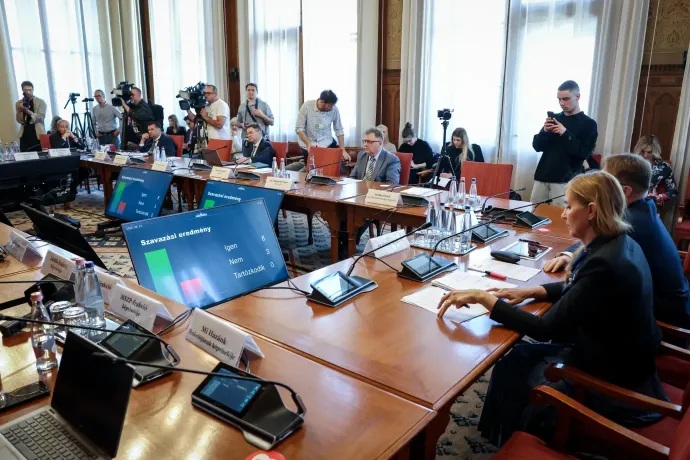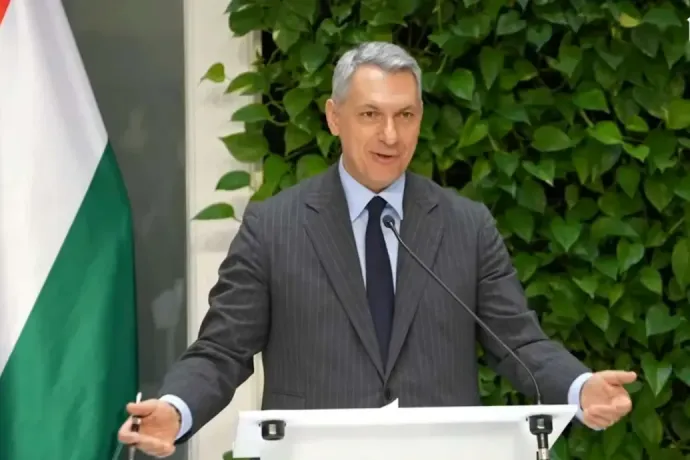Justice Committee of Hungarian Parliament approves amended transparency bill, with further restrictions for those affected by it

The Hungarian Parliament’s Justice Committee held an in-depth debate on the so-called transparency bill on Tuesday morning. If Parliament adopts it, the bill will allow the government to stifle media outlets and NGOs it sees as threatening the country's sovereignty, simply based on the recommendation of the Sovereignty Protection Office (SPO).
At the beginning of the meeting, a group of protesters held up a banner in support of the independent press and of civil society groups targeted by the proposal. The banner held up by the activists read: “Free press, free civil society”. Imre Vejkey, the committee's KDNP chair, called a short break and warned the activists that such tools were not allowed in the chamber.
Amendments to the original bill submitted on Monday afternoon were also supposed to be discussed at the meeting, one of which suggests stripping the organizations on the government's list (of those considered a threat to the country's sovereignty, as per the recommendation of the SPO) of the 1 percent tax donations already offered to them this year. (In Hungary it is possible to specifically allocate one percent of one’s personal income tax to certain organizations and foundations of one’s choosing. The deadline for doing so was 20 May.) Under the original bill, it would have only become impossible to offer the 1 percent tax subsidy to these organizations once the law will have entered into force, i.e. from 2026.
The amendment also suggests that the tax authority should transfer the funds donated to these organiziations in this way to the László Batthyány-Strattmann Foundation for Healing. This foundation was established by the government in January of this year for the purpose of assessing individual applications for subsidies for specific medicines and medical aids on a case-by-case basis.
Another important amendment to the original bill is that
dual citizens, who also have Hungarian citizenship will not be considered foreign donors.
This was not properly specified in the original draft law and is likely important because Fidesz is still accepting financial donations from abroad via the bank account number provided on its website.
‘An open attack on NGOs’
Momentum MP Szabolcs Szabó started the debate by stating that the proposed law violates EU law, the rules of procedure of Parliament, the law on legislation, and it also does not meet the conditions of unambiguity, while retroactive legislation is completely unlawful. He said that the proposal was incomprehensible and inapplicable, and he was genuinely surprised that Fidesz representatives with legal degrees had also attached their names to it.
The law is not only contrary to the Fundamental Law, but to international law as well, Sándor Rónai of the Democratic Coalition (DK) continued, also saying that
“This law greatly harms Hungary, the remaining free press, and is an open attack on NGOs.”
The DK representative added that with the adoption of this law, Hungary could become a cheap dictatorship. Imre Vejkey, the committee's KDNP chair, rejected this statement, saying that Hungary is a sovereign, democratic state governed by the rule of law. He said that the past 15 years are proof of this.

Both the Fidesz representative who submitted the bill and the State Secretary for Justice could have responded to the questions raised, but they did not do so. Tünde Szabó of Fidesz-KDNP said that the amendment submitted on Monday had only one substantive point: the removal of Hungarians living in other countries from the list of foreign supporters. She reiterated that the law only applies to organizations and does not affect private individuals and opined that
“we have enjoyed freedom of the press in Hungary for 15 years. This will not change.”
Fidesz MP and State Secretary for Justice, Róbert Répássy also did not say anything about the suggestion to retroactively take away the 1 percent tax donations from the organizations placed on the government's list.
According to him, the law only affects organizations that use foreign funding to influence public life. The state secretary said that the goal is transparency and he called suggestions that the law would restrict the operations of any media or NGOs a conspiracy theory.
He said he did not understand those who had protested for NGOs and the media earlier, because in his opinion, the scope of the proposed law was extremely narrow.
Several Fidesz members of the Justice Committee did not even attend the meeting. Those who were present did not speak during the debate itself. The amendment was adopted by the committee with eight votes in favor and three against.
‘You can’t know that in advance’
While the Justice Committee was meeting, Minister of Construction and Transport, János Lázár held a press conference about matters related to his ministry. However, several journalists, including Telex’s reporter also questioned him about the transparency bill.
"The law has not been passed yet, it is still being debated, the minister said at one point, evading questions about the Russian-style law.
The journalist from RTL wanted to know if there was a difference between the EU funds the government would like to receive (which are currently blocked due to the infringement procedure) and those that NGOs or independent media receive through open tenders. The minister was also asked what he thought about the proposal that organizations listed on the register could have their 1 percent donations taken away this year. The question was also raised as to whether the minister considered it a scam that people had donated 1 percent of their taxes to certain organizations, and now, after the deadline for making donations had passed, there is an amendment proposing to give these funds to a state-designated foundation.

Lázár replied with a question: Is there such a law in force? Let’s wait to see if such legislation will be passed and what it will contain! – he advised the RTL journalist. When asked whether he would vote for the bill in its current form, Lázár said that he would consider it.
“I understand that Telex is in a highly agitated state and that you fear for your livelihood, but I should still be allowed to answer the question,” this was János Lázár's response when Telex's journalist asked him a follow-up question while he was answering a previous one. The original question was whether Lázár sees that it is concern about the rule of law and the transparency law which are in fact hindering Hungary from obtaining EU funds.
In response to Lázár's comment, Telex's reporter said, “I have no reason to fear for my livelihood,” to which Lázár replied:
“You can't know that in advance.”
Speaking about the “transparency law”, Lázár said that he believes there is full agreement that it is not good to have foreign money in Hungarian politics, regardless of which side it is on. Furthermore, according to him, everything in the law is a purely technical matter and nothing has been finalized yet. The minister believes that it is not known what the law will look like by the time the president signs it, (in Hungary, a law goes into force after the country's president has signed it -ed) and stressed that the law is still being drafted. When asked whether this applies to taking away the 1 percent donations, Lázár reiterated that this was merely a technical issue. However, the minister added that he was certain there were media outlets that had “engaged in pro-war propaganda” in their reporting on the war in Ukraine, saying, “I am certain that there was Ukrainian money behind it, and I mean that seriously.”
“In my opinion, an activity such as this, which aims to get involved in a difficult question such as our relationship with the Ukrainians, a struggle for freedom, or what our relationship with the Russians is, whether on the side of the Ukrainians or the Russians, should be restricted.” According to the minister, then, all forms of war propaganda must be restricted, regardless of where it comes from. Summing up his views on the transparency law, Lázár said that he hoped it was not that a few editors-in-chief were “soiling themselves because they will now have to make asset declarations.”
For more quick, accurate and impartial news from and about Hungary, subscribe to the Telex English newsletter!